


xxxxxFrom an early
age Leopold II of Belgium was convinced that a country’s path to
greatness lay in the possession of colonial territories. Unable to
convince his government of this, he decided to go it alone. He
formed the International Congo Society in 1879, and then
commissioned the explorer Henry Morton Stanley to return to
central Africa in order to gain rights over productive areas and
the exclusive control of the rubber and ivory trades. This
achieved, he obtained the support of the Berlin Conference
(convened in 1884 to regulate the colonisation of Africa) and
established the Congo Free State, a vast area, 75 times larger than Belgium, in 1885. He had always made it
clear that his intention was to end the Arab slave trade in that
area, and bring the benefits of civilisation to the native
population, but once in power he exploited the land for its
natural products and mineral wealth -
LEOPOLD II OF BELGIUM 1835 -
Acknowledgements
Leopold II:
c1866, artist unknown – Musée de la Dynastie, Brussels, Belgium. Map (Congo): licensed under Creative Commons –
https://shsaplit.wikispaces.com/poisonwood_review. Mutilation: this photograph and many of a similar nature were
taken by two English missionaries, John Harris (1874-
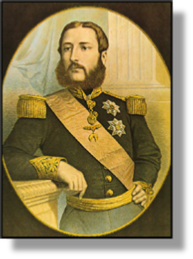 xxxxxLeopold II of Belgium succeeded his father to the
throne in 1865. A strong-
xxxxxLeopold II of Belgium succeeded his father to the
throne in 1865. A strong-
xxxxxOne area
which still remained open for his purpose was the Congo Basin in
the centre of the African continent. Because of its jungle terrain
and the dangers and diseases that went with it, this vast area had
attracted few outside visitors. As we have seen, the Portuguese
navigator Diogo Cao had reached the estuary of the Congo River in
1482 (E4) and,
as a result, missionaries had visited the interior in 1490, and
treaties had been made, though nothing had come of it. With
this area in mind, in 1879 Leopold set up the so-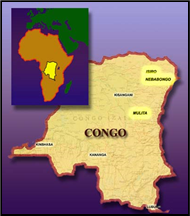 further
in order to establish friendly relations with the tribal chiefs
and set up trading stations. Privately,
he was charged with gaining sovereign rights over productive
areas, and exclusive control of the ivory and rubber trade. Over
the next five years Stanley founded a number of settlements along
the middle Congo, including Leopoldville, and made over 450
treaties with local chiefs, securing trading rights and ownership
over vast regions on the south bank of the River Congo. By his
return in 1884, Leopold was virtual master of what was to become
the
further
in order to establish friendly relations with the tribal chiefs
and set up trading stations. Privately,
he was charged with gaining sovereign rights over productive
areas, and exclusive control of the ivory and rubber trade. Over
the next five years Stanley founded a number of settlements along
the middle Congo, including Leopoldville, and made over 450
treaties with local chiefs, securing trading rights and ownership
over vast regions on the south bank of the River Congo. By his
return in 1884, Leopold was virtual master of what was to become
the
xxxxxAll Leopold
required now was international recognition of his claim to this
vast territory. As we have seen, his opportunity to achieve that
came later in 1884
at the Berlin Conference, convened in the November with the
specific task of regulating European colonisation and trade within
Africa. Organised, as we have seen, by the German chancellor Otto
von Bismarck, it was held amid growing international concern about
a new phase of colonial activity within the continent. In addition
to Leopold’s own ambitions in central Africa -
 xxxxxBut not surprisingly for that day and age, the light
of civilisation -
xxxxxBut not surprisingly for that day and age, the light
of civilisation -
xxxxxAnd this
legalised robbery was enforced by violence. The exploitation of
the land and its products was accompanied by a harsh, brutal
regime, carried out by the concessionary companies and Leopold’s Force Publique, a private army that
terrorised the native population. The state became a vast labour
camp in which flogging, torture, mass killing and widespread
mutilation were routine. And the 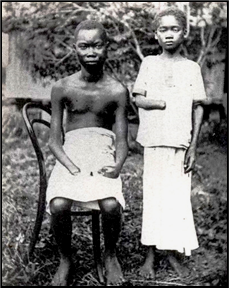 harvesting
of wild rubber became a particularly gruesome industry following
the invention of the pneumatic tyre in the mid-
harvesting
of wild rubber became a particularly gruesome industry following
the invention of the pneumatic tyre in the mid-
xxxxxAs early as
1888 news of these atrocities began to leak out. In that year
Cardinal Charles Lavigerie, a French missionary, gave a sermon in
Paris which shocked his audience by its gory account of the Congo
slave trade. This prompted Leopold to convene an international
conference in Brussels in 1889-
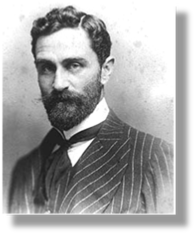 xxxxxMatters came to a head in 1900 when a native uprising
was mercilessly crushed and details of flogging, mutilation and
murder were circulated. Leopoldxattempted
to silence the press, but the following year a former shipping
clerk named Edmund Dene Morel (1873-
xxxxxMatters came to a head in 1900 when a native uprising
was mercilessly crushed and details of flogging, mutilation and
murder were circulated. Leopoldxattempted
to silence the press, but the following year a former shipping
clerk named Edmund Dene Morel (1873-
xxxxxApart from
his infamous venture into colonialism, Leopold is remembered today
for the palatial public buildings he erected in Brussels, Ostend
and Antwerp -
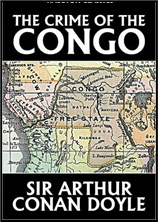 x
x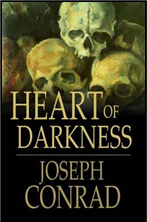 xxxxIncidentally, in 1904 Morel
and Casement formed the Congo Reform
Association in Britain to fight for much-
xxxxIncidentally, in 1904 Morel
and Casement formed the Congo Reform
Association in Britain to fight for much-
xxxxx…… Roger Casement, the British consular official who, in 1904, drew up the harrowing report on conditions in the Congo Free State, was awarded a knighthood in 1911 and hanged as a traitor five years later. An ardent Irish nationalist, when the First World War broke out in 1914 he went to Germany in the hope of raising a force of Irish war prisoners to fight against the British. His mission was unsuccessful, but when he returned to Ireland in a German submarine he was captured on landing. He was taken to London, tried for high treason, and hanged.
Vc-
Including:
The Congo
Free State



